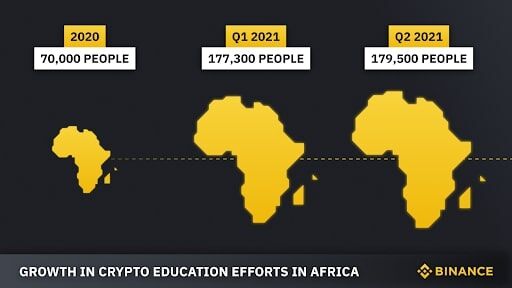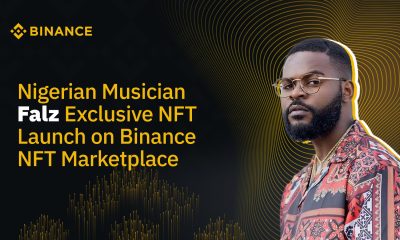In this week’s news roundup, you’ll read about the Bitcoin Matatu NFT project that will launch on Stacks, Binance’s expansion into Francophone Africa with over 400,000 Africans educated on cryptocurrency in Africa, and other top crypto stories.
Kenyan Bitcoin Matatu NFTs to Launch on Stacks Blockchain to Boost Bitcoin Adoption in Africa
Bitcoin Matatu is set to launch a Bitcoin Matatu NFT project that will utilise the Kenyan Matatu Culture to help promote Bitcoin adoption in the African continent.

Matatu is a Swahili word that means ‘three’ and is used in Kenya to refer to the Public Service Vehicles (PSV) that are customised with graffiti, neon lights, among others. The Bitcoin Matatu NFT project is set to use the country’s Matatu culture to expedite Bitcoin adoption across Africa.
The project consists of 254 (1 of 1) NFTs that will incorporate three themes namely Bitcoin Citadel, Freedom, and Bitcoin to the Moon.
The project has three objectives: showcase the Kenyan Matatu culture to the world, utilise a cool aspect of the urban culture to onboard the Kenyan youth aged between 15 and 25 years to the Bitcoin Standard, and finally, to raise funds for the Bitcoin Matatu DAO.
All Bitcoin Matatu NFTs will be minted, displayed, and auctioned in Layer on Stacks. In addition, the NFTs will also be showcased at Tafaria Castle, an ultramodern museum situated in the slopes of Mt. Kenya in line with the Bitcoin citadel theme. 21 [1 of 1] Bitcoin Matatu NFTs will be minted at a time.
Some Bitcoin Matatu NFTs will be solely minted and awarded to the community members either at random or as prizes for various competitions that will be held on discord and Twitter. 5% of the proceeds from the NFT project sale will go to Built With Bitcoin, an NGO that is helping build schools in Africa using Bitcoin donations.
The project, which was founded by Guantai Kathurima – a bitcoiner from Nairobi, Kenya, is available on Github.
Binance Expands Into Francophone Africa After Successfully Educating Over 400,000 Africans on Cryptocurrency
Binance has announced its expansion into Francophone Africa to help drive blockchain and crypto adoption in Africa.
 The news comes at a time when Binance has been able to successfully educate more than 400,000 Africans on cryptocurrencies via its free crypto courses dubbed Binance Masterclasses.
The news comes at a time when Binance has been able to successfully educate more than 400,000 Africans on cryptocurrencies via its free crypto courses dubbed Binance Masterclasses.
The cryptocurrency exchange launched its courses in January 2020 and had educated over 70,000 Africans one year after the launch of the Masterclass. Since then, Binance has so far been able to educate more than 177,000 Africans in the first quarter of 2021 and over 179,500 in the second quarter of 2021 in a bid to create the education infrastructure needed by Africans to be financially informed and free.
Binance held the first masterclass dedicated to French-speaking Africans in July 2021 and got participation from 3,900 crypto beginners. This would later be followed by a trading boot camp for crypto enthusiasts in September 2021 and received participation from over 17,400 people. To date, more than 25,000 people in Francophone Africa have benefitted from the Binance Masterclass.
Speaking about the expansion into Francophone Africa, Carine Dikambi, Binance’s Francophone Africa Lead, said, “The African continent holds some unique opportunities for cryptocurrency adoption and development. As such, we see blockchain education as vital in actualising these opportunities. It is also clear that the potential of Francophone Africa to be a core part of this development is endless and we are committed to ensuring that more people have access to the right information.”
Binance is expected to hold its first offline event for crypto enthusiasts on December 4, and December 11, 2021, in Yaounde and Douala in Cameroon. Both events will help educate attendees on the fundamentals of blockchain, the Binance ecosystem, how to set up a Binance account, trading fundamentals, and much more.
$50 Million Feature Film, ‘Antara’ to Sell Movie Rights via NFT Drops
Arabian Camels, the first NFT community to create a Hollywood movie, has announced the launch of an ‘Antara Movie NFT’ that will give buyers up to 50% of the IP rights to the $50 million feature film, ‘Antara’.
The feature film is based on the life of Antarah Ibn Shaddad, an ancient Arabian knight and poet who was famous for his adventurous life. Potential film distributors will pay the owners of the Antara film NFTs to distribute the movie in theatres and/or streaming sites thus tying the Arabian Camel community into millions of dollars worth of value in the real world. Arabian Camels is looking to merge Movies and NFTSs with DeF, Gaming, and the Metaverse with a focus on community. The NFT drop is anticipated this December.
“The Arabian Camels is the only NFT community that has managed to position itself uniquely between movies and NFTs. As a new pop culture brand, we are now ready to launch our movie strategy, gaming strategy, and token launch on major exchanges,” said Alexander Aamrtei, the inventor of Movie NFTs and Producer of Antara.
To learn more about Bitcoin, download the Bitcoin Beginner’s Handbook for free.


 Features3 years ago
Features3 years ago
 Bitcoin2 years ago
Bitcoin2 years ago
 Features3 years ago
Features3 years ago
 Features3 years ago
Features3 years ago
 Features3 years ago
Features3 years ago
 Features3 years ago
Features3 years ago
 Features3 years ago
Features3 years ago
 Features7 months ago
Features7 months ago


 The news comes at a time when Binance has been able to successfully educate more than 400,000 Africans on cryptocurrencies via its free crypto courses dubbed Binance Masterclasses.
The news comes at a time when Binance has been able to successfully educate more than 400,000 Africans on cryptocurrencies via its free crypto courses dubbed Binance Masterclasses.
















 Central African Republic (CAR) has set up a 15-member committee that will be responsible for developing a bill on the use of cryptocurrencies and tokenization in the region.
Central African Republic (CAR) has set up a 15-member committee that will be responsible for developing a bill on the use of cryptocurrencies and tokenization in the region.
